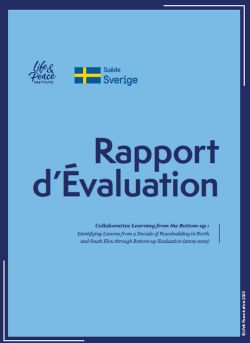Publications & reports
Evaluation Report (Rapport d’Évaluation)
Collaborative Learning from the Bottom-up
Identifying Lessons from a Decade of Peacebuilding in North and South Kivu through Bottom-up Evaluation (2009-2019)

- Date
- Type
- Report
Funded by Sida & coordinated by the Life & Peace Institute, this evaluation was carried out with the support of a Reference Group bringing together fifteen national & international organisations specialised in the field of conflict transformation & active in North and South Kivu. Data collection took place in December 2019 and January 2020 in four main areas/territories in North and South Kivu: 23 localities were reached and 955 people were consulted in groups or individually.
Summary
Funded by Sida and coordinated by the Life & Peace Institute (LPI), this evaluation was carried out with the support of a Reference Group bringing together fifteen national and international organisations specialised in the field of conflict transformation and active in North and South Kivu. STAREC1 also participated. As part of this collaborative approach, the RG worked with the evaluators in designing the methodology, conducting data collection, analysing data and sharing of findings in evaluation sites. Data collection took place in December 2019 and January 2020 in four main areas/territories in North and South Kivu (Uvira, Kalehe, Masisi and Rutshuru): 23 localities were reached and 955 people (34% of which were women) were consulted in groups or individually. Around thirty political actors (Provincial Ministers, Directors of Cabinet, Deputies, etc.) were also interviewed at the provincial level to shed light on these institutional perspectives on conflict transformation interventions and their results.
The evaluation process identified 18 major outcomes to which peacebuilding efforts have contributed. They are described in detail in the report. The evaluation finds that the outcomes "show the capacity of conflict transformation organisations to bring about changes at individual, relational and in some cases even institutional level, in a complex and volatile political and security context." (p. 25) These critical contributions need to be seen considering several "fundamental and recurring limitations which have been highlighted during data collection and consultations conducted at the local and provincial levels." (p.26) These are analysed as eight critical insights in the second part of the report.